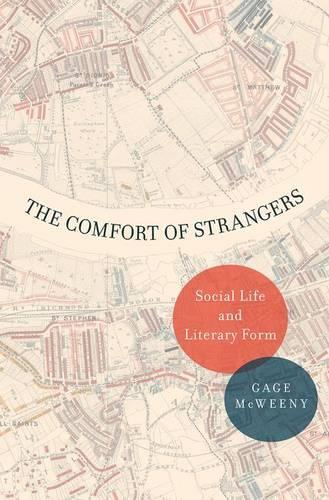Overview
In most accounts, literature of the nineteenth century compulsively tells the story of the individual and interiority. But amidst the newly dense social landscapes of modernity, with London as the first city of one million inhabitants, this literature also sought to represent those unknown and unmet: strangers. Focusing on the ways that both Victorian literature and modern social thought responded to an emergent ""society of strangers,"" The Comfort of Strangers argues for a new relation between literary form and the socially dense environments of modernity, insisting upon strangers in these works not as alienating, fearsome others, but a relatively banal yet transformative fact of everyday life, the dark matter of the nineteenth-century social universe. Taking up ""the literature of social density,"" Gage McWeeny engages with a range of generically diverse works from the age of Victorian sympathy to illuminate surprising investments in ephemeral relations, anonymity, and social distance. Life amidst strangers on urban streets and markets produced new social experiences, both alluring and fearsome, and McWeeny shows how realist literary form is remade by the relational possibilities offered by the impersonal intimacy of life among those unknown and the power of weak social ties. Reading works by Charles Dickens, Matthew Arnold, George Eliot, Oscar Wilde, and Henry James, he discovers a species of Victorian sociality not imagined under J.S. Mill's description in On Liberty of society as a crowd impinging upon the individual. Instead, McWeeny mines nineteenth-century literature's sociological imagination to reveal a set of works diverted by and into intensities located in strangers and the modern forms of sociality they emblematize. Treating seriously the preference for the many over the few, the impersonal intimacy of strangers over those who are friends and acquaintances, The Comfort of Strangers shows how literature and sociology together produced modern understandings of the social, opening up canonical works of the nineteenth century to a host of strange, new meanings.
Full Product Details
Author: Gage McWeeny (Professor of English, Professor of English, Williams College)
Publisher: Oxford University Press Inc
Imprint: Oxford University Press Inc
Dimensions:
Width: 23.60cm
, Height: 2.80cm
, Length: 16.00cm
Weight: 0.476kg
ISBN: 9780199797202
ISBN 10: 019979720
Pages: 240
Publication Date: 18 February 2016
Audience:
College/higher education
,
Undergraduate
,
Postgraduate, Research & Scholarly
Format: Hardback
Publisher's Status: Active
Availability: To order

Stock availability from the supplier is unknown. We will order it for you and ship this item to you once it is received by us.
Reviews
A dazzling achievement. Gage McWeeny captures strangers in all their elusiveness, and, in doing so, renders the most familiar works of the Victorian period newly--startlingly--strange. --Amanda Claybaugh, Harvard University Faced with a Victorian literature long seen as devoted to the strong social bonds of marriage, familial relations, and sympathy, Gage McWeeny sets out to study instead the 'weak social ties' and 'stranger relations' that exerted a surprising force on Victorian imaginations. The result is an incisive, suavely-argued, and strikingly original book that promises to refresh debate on nineteenth-century literature's relations with the then-emergent discourses of modern social thought. --James Buzard, Massachusetts Institute of Technology This terrific new book shows that, although there wouldn't seem to be much to say about strangers (where's the fun in talking about the people you don't know?), their often unacknowledged presence at the edges of thought in fact exerts immense pressure on the forms of Victorian literature and culture. Revealing the plain fact of other people as a roar on the other side of sociability, The Comfort of Strangers forces us to see the strong force of the weak social ties that linked literary representation to everyday life in nineteenth-century Britain. --Kent Puckett, University of California, Berkeley In this gracefully written and richly suggestive study of the power of weak social ties, Gage McWeeny shows just how often, and in what a wide range of contexts, Victorian writers put aside questions of personal intimacy or emotional intensity in order to explore the value--and the pleasures--of encountering all the many people one can never know except as strangers. --Stephen Arata, University of Virginia
a vibrant contribution to the study of literary form's entanglements with the methods and concerns of emerging social science Camilla Cassidy, Times Literary Supplement
...the real thrust of the book is not really historical, but rather theoretical. The core contention is that Arnold, Eliot, Wilde, and James theorize the social in complex and compelling ways, and those ways affect the formal patterns in their art. That claim seems interesting and important regardless of whether it is the product of the rise of a new kind of society in the nineteenth century. And if the current turn toward presentism in Victorian studies ends up changing the field, perhaps at least one of the changes it might induce would be a willingness to take such claims seriously in their own right. * Patrick Fessenbecker, Victorian Studies * a vibrant contribution to the study of literary form's entanglements with the methods and concerns of emerging social science * Camilla Cassidy, Times Literary Supplement *
Author Information
Gage McWeeny is Professor of English at Williams College.




